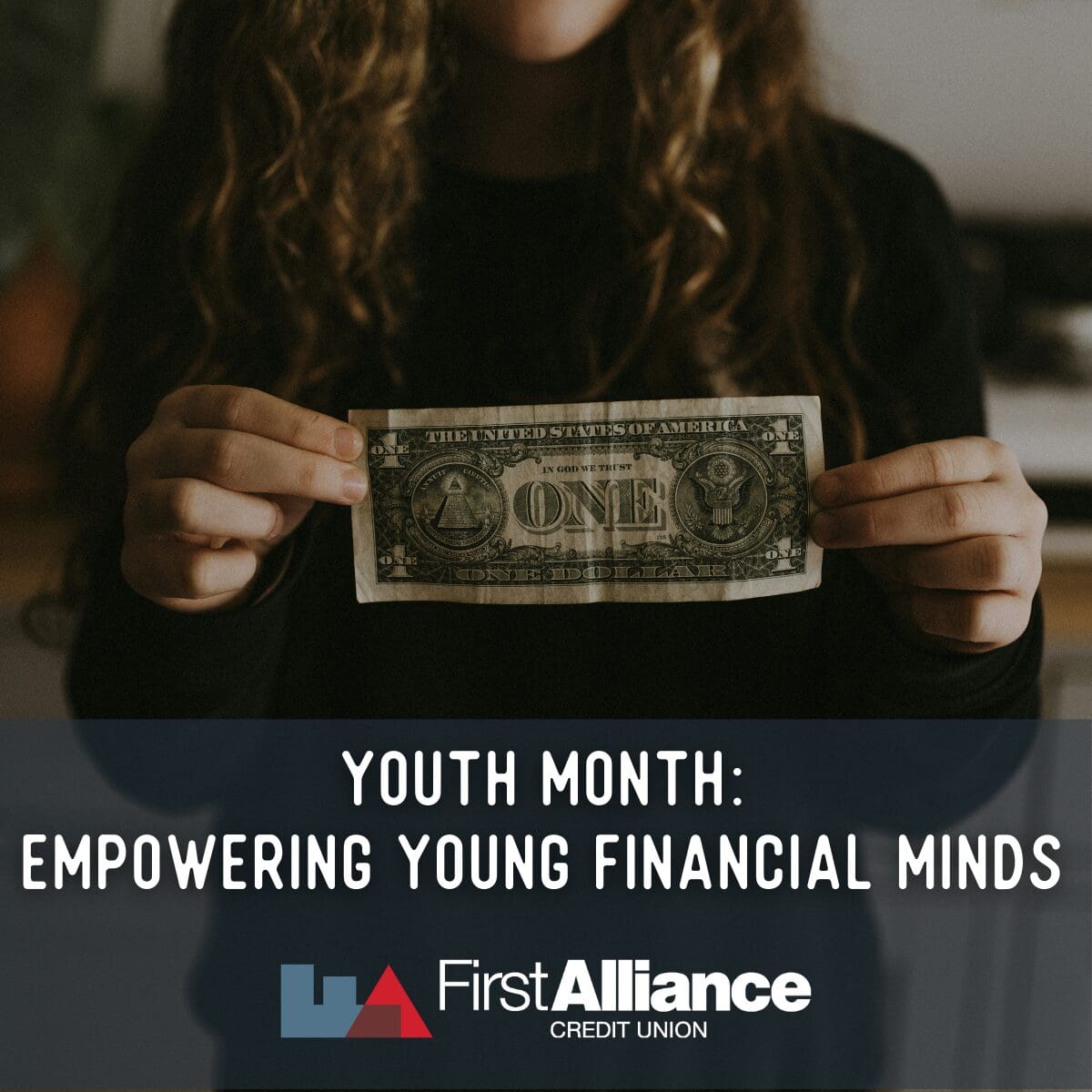This guide is sponsored by First Alliance Credit Union

Your Money in Minnesota with First Alliance Credit Union
![]()
Each month, First Alliance Credit Union provides a tip to help you manage your money in Minnesota. It’s your money, make it work for you! With expert help and advice on various relevant topics. This is your one-stop-shop for your money needs.
First Alliance Credit Union serves almost 20,000 members across the 5 South East Minnesota Counties of Olmsted, Dodge, Goodhue, Wabasha, and Winona. Today, membership is open to anyone who lives, works, worships, owns a business, or attends school in our 5 county communities.
No matter where the future leads, First Alliance Credit Union is committed to assisting its members in managing their money in Minnesota, sharing resources, and providing lending options, in order to assist them in making smart financial decisions through every stage of life.
YOUR MONEY IN MINNESOTA
Job Proof Your First Mortgage
Bi‑Weekly Payments & Bonus Rent: The Fast Track to Early Mortgage Freedom
Owning a home shouldn’t take 30 long years. Two easy moves can send your loan balance sprinting toward zero—and keep your budget stress‑free along the way.
Move 1: Switch to bi‑weekly payments. Split your monthly bill in half and pay every 14 days. The calendar sneaks in an extra full payment each year, cutting roughly four years off a standard loan and saving thousands of dollars in interest. If cash flow ever feels tight, just flip back to monthly—no penalties, no drama.
Move 2: Put your spare room to work. Rent to a trusted friend or family member and set automatic transfers so every dollar speeds up payoff:
- 40 % to extra principal
- 30 % to a repair fund
- 30 % to an emergency pot
Result: mortgage melts away faster, savings grow on autopilot, and you reach true home‑ownership years sooner. First Alliance Credit Union can run the numbers and set up your custom fast‑pay plan in a single visit.
Ready to shave years off your first loan?
Break the 20% Myth
Still think you need a suitcase of cash to buy a home? Good news: many first-time homebuyer loans shrink the downpayment hurdle to 3 %–5 % instead of 20 %. That single change slashes the upfront check from “impossible” to “manageable.” Pair the low-down payment with local grant programs (check out Minnesota and local programs)—often a few thousand dollars toward closing costs—and you keep far more of your own savings where it belongs: in the credit union.
Why it matters: money left in your account on day one becomes your “uh-oh” fund on day two. Furnaces fail, roofs leak, and job markets wobble. Running close to zero after closing sets you up for credit card panic; walking in with liquid savings lets you handle surprises calmly.
Checklist to Preapproval:
- Pull two recent pay stubs and bank statements.
- Schedule a 15-minute prequal call with a First Alliance CU Real Estate Lending Advisor.
- Complete the online education module—six hours of plain language finance that demystifies credit scores, inspections, and closing costs.
Walk away with a preapproval letter that tells sellers, “This buyer is ready,” while your emergency fund stays fully stocked.
Ready to see how small your down payment can be? Spend 15 minutes with a First Alliance mortgage guide and walk away prequalified—emergency fund untouched.
Youth Month: Empowering Young Financial Minds
Looking for a modern way to help your kids master money management? This Youth Month learn how tools like Greenlight can support financial literacy without any sales pitch—just real information for raising financially smart kids.
Start Smart:
Begin by introducing the basics of money management. Kids can learn the value of money through hands-on experiences like using a debit card designed just for them. Greenlight offers a kid-friendly debit card, allowing children to make spending decisions while parents maintain flexible controls.
Learn & Manage:
Digital tools make financial education engaging. With features like automated allowances, spending alerts, and chore management, young users can track how money is earned and spent. These practical lessons teach budgeting and help kids set saving and spending goals—skills that are essential for lifelong financial success.
Practice Responsibility:
Encourage healthy money habits by letting kids experiment with real transactions in a safe environment. Whether it’s learning to manage an allowance or making small purchases, these experiences build confidence and prepare them for future financial decisions.
Ready to inspire your young ones to become savvy money managers? Embrace Youth Month with First Alliance Credit Union by exploring digital tools like Greenlight that make financial learning fun and practical—empowering your kids with the skills they need for a bright financial future!
Program Disclaimer: *First Alliance Credit Union members are eligible for the Greenlight SELECT plan at no cost when they connect their First Alliance Credit Union account as the Greenlight funding source for the entirety of the promotion. Subject to minimum balance requirements and identity verification. Upgrades will result in additional fees. Upon termination of promotion, customers will be responsible for associated monthly fees. See terms for details. Offer ends 10/15/2026. Offer subject to change and partner participation.
Mastercard Issuing Statement: The Greenlight® prepaid card is issued by Community Federal Savings Bank, member FDIC, pursuant to license by Mastercard International.
Youth Month: Empowering Young Financial Minds
Next month is Youth Month! Where we celebrate the potential of the next generation by emphasizing financial literacy. Helping kids learn to save, budget, and invest early sets the stage for smart money decisions and lifelong success, here are some tips to get started:
Keep it Simple: Start with the basics—simple activities like using a piggy bank or tracking allowances on a chart teach children the value of a dollar.
Use Resources: Find engaging money lessons from books, blogs, YouTube tutorials, and free online activities make these concepts accessible and fun for kids and teens.
Make it Age Appropriate: As young learners mature, they can explore more advanced topics like budgeting, compound interest, and basic investing.
Get Hands-On: Teenagers can gain confidence with money by learning to manage income and expenses through using a debit card and a mobile banking app.
Investing in financial education today empowers the next generation to become confident, capable money managers. Ready to empower your young saver with essential money skills? Celebrate Youth Month by opening a Youth or Teen Account at First Alliance Credit Union start building the foundation for a bright financial future today!
Finances on Track: Vacation Planning
Dreaming of that perfect getaway but worried your bank account might not agree? With a little financial foresight and strategic planning, you can enjoy a fantastic vacation without breaking the bank. Here’s how to keep your finances on track while planning the trip of your dreams:
Set Up a Vacation Savings Fund
Kickstart your travel dreams by depositing regularly into a dedicated savings account, such as a Vacation Club account at First Alliance Credit Union. These accounts are designed to help you save throughout the year for your vacation by giving a dedicated spot to save, with an added bonus of your balance and accrued dividends being automatically transferred to your checking or savings account on June 1st each year. This timing ensures that your funds are available right when you need them to cover travel expenses. It’s a smart and automated way to align your savings with your planned adventures, making the process effortless and stress-free.
Budget for Every Adventure
Break down your vacation expenses—flights, accommodations, meals, and even a little extra for spontaneous fun. With a clear picture of your costs, you can set realistic savings goals and avoid last-minute financial surprises.
Travel Smart, Save More
Flexibility is your best friend when it comes to saving money. Consider traveling during off-peak seasons to enjoy lower prices on flights and hotels. Don’t forget to leverage travel rewards programs and hunt for deals online—every dollar saved brings you closer to that dream destination.
Plan Ahead for Peace of Mind
A well-organized vacation plan isn’t just about having fun—it’s about eliminating stress. By budgeting for unexpected expenses and planning your finances in advance, you can relax and fully enjoy your time away from home.
Ready to transform your travel dreams into reality while keeping your finances solid? Explore First Alliance Credit Union’s complete guide on smart vacation planning and start paving the way to your next adventure today!
Finances on Track: Debt Consolidation
Feeling like you’re drowning in bills? Debt consolidation might just be your life raft! Here’s how it works and why it can help you get back on track:
One Payment to Rule Them All
Say goodbye to juggling multiple due dates! With debt consolidation, all your debts are combined into one easy monthly payment. It’s like putting your finances on autopilot.
Lower Interest, More Savings
Tired of high interest rates eating your paycheck? Consolidating debt often means scoring a lower rate, leaving more money in your pocket for the important stuff (like pizza night).
Budgeting Made Simple
No more trying to keep track of a dozen payments. With just one to focus on, staying on top of your finances feels a whole lot less stressful.
Boost That Credit Score
Paying on time becomes second nature, which can give your credit score a nice little boost. Future you will thank you!
If your finances feel like a circus, debt consolidation can turn the chaos into calm. It’s your ticket to financial peace of mind. Explore First Alliance Credit Union’s complete guide to understanding debt consolidation loans and take the first step today!
Last-Minute Holiday Shopping Tips
The holidays are here, and if you still have gifts to buy, don’t panic! With a little planning and strategy, you can cross everyone off your list without breaking the bank—or your sanity.
Make a List: Write down who you’re shopping for and set a budget for each person. Staying organized prevents overspending and impulse buys.
Shop Online: Many retailers offer expedited shipping or in-store pickup. Take advantage of these options to save time and avoid the crowds.
Check Local Stores: Small businesses often have unique gifts and shorter lines. Plus, you’ll be supporting your community! In Rochester, stop by NerdinOut for comic books or toys and the Fit Loon for a healthy treat.
Opt for Gift Cards: When in doubt, gift cards are a thoughtful way to let someone pick what they truly want. Consider Salon Chic for beauty lovers or Inner Balance Massage for a moment of relaxation.
DIY Gifts: Homemade treats, crafts, or a heartfelt letter can be just as meaningful as store-bought items. For inspiration, grab some holiday treats from Makay Sweets to fuel your creativity.
Stay Calm: Shopping under pressure can lead to poor decisions. Take a deep breath, and remember the holidays are about connection, not perfection. Better yet, book yourself an appointment at Gloss Nails. You deserve it!
With these tips, you can finish your shopping stress-free and enjoy the holiday cheer! Get started on your list by downloading the free Gift Giving Planner from First Alliance Credit Union.
5 Tips to Score Big on Black Friday Deals
Ready to conquer Black Friday like a pro? Here’s how to snag the best deals without breaking a sweat (or the bank):
Plan Ahead: Make a list of must-have items and stick to it. Impulse buys are the enemy of your budget! Better yet, get started on your budget with this guide from First Alliance CU.
Set a Budget: Decide what you can afford before the sales start. Pro tip: Use cash-back credit cards (like First Alliance’s uChoose Rewards Credit Card!) to get even more value.
Follow Your Favorite Brands: Sign up for newsletters and follow brands on social media. They often share exclusive deals and early access to sales.
Start Early: Some of the best Black Friday deals start on Thursday—or even earlier online!
Check Return Policies: Sales are sweet, but a strict return policy can sour the deal. Always read the fine print.
By following these 5 tips you can stay within your budget and save your wallet a lot of undue strain. So, gear up, stay smart, and may your Black Friday shopping be as rewarding as it is fun!
From Side Hustle to Success: How to Launch Your Small Business
Starting a small business can feel like climbing a mountain in flip-flops, but with the right steps, it’s much easier than it seems. Just ask Daniel, who went from mowing lawns to building his own landscaping business one step at a time. Let’s break down how he did it (without losing his sanity) so you can follow in his footsteps!
- Seek Local Resources: Daniel kicked things off by visiting Collider, a local entrepreneur hub. With their guidance, he got mentorship, learned the ropes, and found a place to brainstorm (and drink way too much coffee).
- Write a Business Plan: Thanks to the Small Business Development Center, Daniel turned his ideas into a plan with financial projections. Because “winging it” isn’t the best business strategy!
- Form an LLC: To protect his personal savings from any “business bloopers,” Daniel registered his landscaping business as an LLC and got an EIN. Simple, right?
- Secure Funding: After some strategic penny-pinching, Daniel needed a little extra cash for a truck. Enter First Alliance Credit Union, where he scored a business loan to expand his reach (and carry his gear without borrowing Mom’s car).
- Market and Grow: Social media, flyers, and a few strategic partnerships helped Daniel grow his customer base faster than weeds in the summer.
If Daniel can turn his lawn-mowing gig into a thriving business, you can tackle your big idea too—without breaking a sweat. With the right support and a solid plan, that mountain doesn’t look so tall after all. Ready to take the first step? Get in touch with First Alliance Credit Union today!
5 Reasons to Open a Pet Savings Account
Pets are family, but their care can be costly, especially as they age. Unexpected vet bills can be overwhelming, making a dedicated pet savings account invaluable. Think of it as your pet’s personal fund for expenses like food, toys, grooming, and vet visits.
A pet savings account also offers:
- Peace of Mind: It ensures you’re financially prepared for routine check-ups, emergencies, and everyday needs.
- Dedicated Funds: Specifically, for pet-related costs, it helps manage food, grooming, and vet bills without scrambling for cash.
- Financial Discipline: Regular deposits into a separate account make budgeting easier and prevent you from using funds for other purposes.
- Special Bonus: First Alliance CU donates $10 to Paws and Claws for every new Pet Savings Account that is opened.
- Unexpected Costs: Even with pet insurance, not all expenses are covered. A pet savings account helps handle unforeseen costs, like emergency surgeries.
Open a pet savings account at First Alliance Credit Union to ensure you’re ready for any surprises your furry friend might bring. It’s a small step that offers big rewards for both you and your pet.
Make Back-to-School a Breeze with Greenlight!
English. History. Financial Literacy. Get your kids set up for the school year with Greenlight, the debit card and money app for kids! And hey, First Alliance Credit Union members, your family can join for free!†
🌟 Now here’s why we love Greenlight: 🌟
Instant Money Transfers: Lunch? After-school activities? Send your kids money in a flash!
Check off Chores: From homework to dishes, you can assign kids chores in the app to make the post-school routine a breeze.
A Debit Card of Their Own: They spend wisely. You see their spending history right in the app.
Flexible Parental Controls: You choose where your kids can spend and set spending limits.
That’s right, kids and teens earn through chores, set savings goals, and spend wisely with their own debit cards. As parents you can: automate allowance, set flexible controls, and get real-time notifications.
Set your kids up for success this school year and beyond with Greenlight and First Alliance Credit Union. Learn More Here!
This guide is sponsored by First Alliance Credit Union.
The Greenlight card is issued by Community Federal Savings Bank, member FDIC, pursuant to license by Mastercard International. †First Alliance Credit Union members are eligible for the Greenlight SELECT plan at no cost when they connect their First Alliance Credit Union account as the Greenlight funding source for the entirety of the promotion. Subject to minimum balance requirements and identity verification. Upgrades will result in additional fees. Upon termination of promotion, customers will be responsible for associated monthly fees. See terms for details. Offer subject to change and partner participation.
Christmas in July
Christmas in July
Get a jump start on your holiday finances by diving into Christmas in July! With some clever planning now, you can dodge the chaos and money stresses of the holiday season, guaranteeing a jolly, worry-free celebration for you and your loved ones!
Kick things off by establishing a budget that is realistic for you. Pin down your total holiday spending for gifts, decorations, and celebrations. Then, break this figure into smaller, monthly savings targets. For example, if you’re eyeing a $600 holiday budget, set aside $100 each month starting in July.
Then, open a holiday-specific savings account. This separate account acts as a barrier against the temptation to use these funds for day-to-day expenses. First Alliance Credit Union offers holiday accounts that are easy to set up online or in-branch!
Next, leverage the bounty of summer sales and promotions. July is ripe with opportunities to snag bargains on gifts and festive decor, potentially saving you a bundle. Enhance your savings further by tapping into cashback apps and loyalty programs to maximize every dollar spent.
And lastly, don’t forget to embrace the art of DIY gifting. Crafting your own gifts infuses them with a personal touch that often holds more value than pricier, store-bought alternatives. Starting now gives you ample time to put together heartfelt, cost-effective presents.
By planning proactively and employing these savvy strategies, your families can look forward to a financially carefree holiday season!
Ready to save with a Holiday Account at First Alliance CU? Learn More Here!
Crafting Your Budget-Friendly Plan for a Thrifty Summer Escape
Crafting Your Budget-Friendly Plan for a Thrifty Summer Escape
Planning your dream vacation doesn’t need to break the bank. Get ready for a budget-savvy summer adventure with our top-notch tips!
- Set a realistic budget: Determine how much you can afford to spend and stick to it.
- Travel off-peak season: Consider traveling during non-peak times to score lower prices on flights and accommodations.
- Choose budget-friendly destinations: Explore destinations where your dollar can stretch further.
- Opt for accommodations with kitchenettes: Save on dining expenses by choosing accommodations with kitchen facilities to cook your own meals.
- Embrace free and low-cost activities: Take advantage of nature hikes, local markets, and public beaches for entertainment.
- Use credit card rewards: Offset costs by using rewards points or cashback offers from your credit card.
- Plan ahead: Book flights and accommodations well in advance to snag the best deals.
You’ll enjoy a stress-free vacation when you plan using First Alliance Credit Union’s free vacation budget worksheet to organize the costs of your next adventure. Let’s make your sunny dreams a budget-friendly reality!
Essential Financial Tips for Homebuyers
Essential Financial Tips for Homebuyers
As you embark on your journey to homeownership, it’s crucial to be financially prepared. Let’s make sure you’re on the right track with our financial checklist:
Check Your Credit Score: Lenders use this score to assess your credit history and determine your interest rates. Aim for a score of 640 or higher for most mortgage loans.
Review Your Debt-to-Income Ratio: This ratio compares your monthly debt payments to your monthly income before taxes. Keeping this ratio low ensures you can manage your payments and boosts lender confidence.
Start Saving for a Down Payment: While a 20% down payment is ideal to avoid private mortgage insurance, there are options for lower down payments such as 3% at First Alliance Credit Union.
Remember Closing Costs: Closing costs typically range from 3% to 6% of the home’s price. For instance, if the home is listed at $300,000, a 6% closing cost would amount to $18,000.
Build Up an Emergency Fund: Unexpected expenses can arise with homeownership, so having savings set aside for emergencies can help you avoid financial stress.
Consider Pre-Approval: Getting pre-approved for a mortgage strengthens your home purchase offer. It involves a lender reviewing your financial situation to determine your loan eligibility.
By following these steps, you’ll be well-prepared for the exciting journey of homeownership.
Ready to buy a home? First Alliance Credit Union can help support you every step of the way.
5 Savvy Tips to Dodge Online Romance Scammers
5 Savvy Tips to Dodge Online Romance Scammers
Love might be in the air, but so are romance scams! Unfortunately, not everyone claiming to be looking for love, are being genuine.
Romance scammers prey on emotions and aim to drain your wallet and swipe your personal information. Being caught up in a romance scam can be a rollercoaster that wrecks your emotions, bank accounts, and credit scores.
1. Be Skeptical of Strangers Online: Make sure to assess the situation and take a step back if necessary, especially if they are asking you to send them money.
2. Avoid Sharing Sensitive Information: Including financial details, passwords, or other sensitive information.
3. Research and Google Reverse Image Search: Scammers often use stolen images to create fake identities. Check if the person’s photos are used elsewhere online with this tool.
4. Verify Identities Through Video Calls: This helps ensure you’re talking to a real person.
5. Trust Your Instincts: If something feels off, trust yourself.
Navigating the online love scene can be tricky, but now you’re armed with 5 tips on how to avoid romance scams. If you have any questions, contact a First Alliance Credit Union Member Experience Advisor today by visiting https://www.firstalliancecu.com/
Setting Financial Goals in 4 Simple Steps
Setting Financial Goals in 4 Simple Steps
Financial success begins with a clear roadmap, and setting effective financial goals is the key to navigating that path. By following these four simple steps, you can create a solid foundation for your financial journey.
Step 1: It’s Time for a Money Checkup
Start by evaluating your current financial status – it’s like giving your piggy bank a doctor’s visit. You’ll get a better understanding of your income, expenses, debts, and savings.
Step 2: Define Clear and Achievable Goals
Set specific, measurable, achievable, relevant, and time-bound (SMART) financial goals. Whether saving for a down payment, building an emergency fund, or paying off debts, define your goals and deadlines. This clarity fuels focus and motivation!
Step 3: Time to Prioritize Your Goals
Prioritize your goals based on urgency and importance. Tackling high-priority goals first can create a sense of accomplishment and set the stage for future success.
Step 4: Craft a Realistic Money Plan
Consider breaking down big goals into bite-sized, budget-friendly tasks, explore investment options, or seek professional advice to ensure your plan aligns with your aspirations.
By taking these four steps, you’ll empower yourself to take control of your financial future. Regularly revisit and adjust your goals as needed while celebrating milestones along the way. With a well-defined plan, you can turn your financial aspirations into tangible realities when you download First Alliance Credit Union’s financial goal-setting worksheet.
Smart Holiday Shopping: 5 Financial Tips to Keep Your Budget Intact
Smart Holiday Shopping: 5 Financial Tips to Keep Your Budget Intact
It’s the season for joy and generosity, but let’s be real, it’s also a time for financial stress. You might be wondering; how can you stay in the festive spirit without breaking the bank? Well, here are five essential financial tips to keep your holiday shopping merry and bright:
- First things first, set a realistic budget and stick to it. You don’t want to end up in a financial pickle just for the sake of holiday cheer.
- Next up, keep your eyes peeled for discounts and promotions on the items on your gift list. Early-bird sales are a great way to stretch your budget and get more bang for your buck. Who doesn’t love a good deal?
- Shop online early to avoid expensive shipping costs. The sooner you order items online you’ll be more likely to be able to take advantage of free shipping options vs paying a premium for faster delivery.
- Get your creative juices flowing and make a budget-friendly alternative for your loved ones. It’s a win-win situation – you save money and show off your crafty side!
- Lastly, consider doing a gift exchange with your friends and family. Not only does this cut down on the number of gifts you have to buy, but it also ensures everyone receives a thoughtful present without breaking the bank.
By incorporating these financial tips into your holiday shopping, you can enjoy the festive season without compromising your financial stability. Happy and budget-friendly holidays await!
Cultivating an Abundance Mindset for Your Finances in 5 Steps
Cultivating an Abundance Mindset for Your Finances in 5 Steps
Are you dreaming of a life where money flows effortlessly, bills are paid without worry, and opportunities are abundant? How will you turn this dream into a reality? The answer lies in adopting an abundance mindset for your finances in just 5 steps:
- Practice Gratitude: Take a few moments each day to reflect on what you’re grateful for, including the money you already have. Appreciating what you have attracts more abundance into your life.
- Visualize Your Financial Goals: Imagine yourself living a financially abundant life. Picture yourself achieving your financial goals, and feel the positive emotions associated with that vision. Visualization helps manifest abundance into reality.
- Surround Yourself with Positivity: Surround yourself with like-minded individuals who have a positive attitude toward money. Engage in conversations and activities that inspire and motivate you to believe in your financial potential.
- Embrace Learning Opportunities: Educate yourself about personal finance and wealth-building strategies. Knowledge empowers you to make informed decisions and seize financial opportunities when they arise.
- Take Inspired Action: An abundance mindset is not just about positive thinking; it also requires taking intentional action. Set clear financial goals, create a plan, and take consistent steps towards achieving them. When you act in alignment with your desires, the universe conspires to help you achieve financial abundance.
You can jumpstart your positive money mindset when you become a member of First Alliance Credit Union today.
How to Conquer Your Financial Fears in 4 Steps
How to Conquer Your Financial Fears in 4 Steps
Popular Money Related Podcasts
Popular Money Related Podcasts
Are you looking to expand your financial knowledge and gain valuable insights? Immerse yourself in the world of finance and discover a wealth of wisdom through these popular podcasts dedicated to all things money:
- NerdWallet Smart Money Podcast: Get real-world financial questions answered by NerdWallet experts, empowering you to reach your goals faster and make smarter money decisions.
- Planet Money: Explore real-world topics that connect back to the economy. Don’t just understand the economy – understand the world.
- HerMoney with Jean Chatsky: Join host Jean Chatsky as she guides women through the steps they need to take today, for a comfortable tomorrow. Get access to the latest research, tips, and personal advice.
- Suze Orman’s Women & Money: Suze Orman equips women with the financial knowledge and emotional awareness to overcome obstacles that have hindered their financial well-being. Take control of your money – and yourself.
- Good Money Moves: Gain confidence in managing your money with tips and advice from hosts Andy Brownell from KROC AM and Jenna Taubel from First Alliance Credit Union.
These podcasts will help pave your path towards financial success. Don’t miss out, tune in today!
Financial Considerations When Changing Jobs
Financial Considerations When Changing Jobs
We all know that changing jobs can be an exciting adventure, but don’t overlook the financial impact of this transition.
When transitioning between jobs, it’s important to plan ahead for any gap in pay. You’ll need to determine how long you’ll have between jobs and make sure you have a financial cushion to cover living expenses until you get paid by your new employer. Other things to think about include:
- Changing the due dates on your bills to align with your new pay schedule.
- Creating a budget and sticking to it can help you understand your finances
- Trim expenses where you can, cutting back on costs while you wait to get paid.
Furthermore, it’s crucial to understand the changes to your entire paycheck, including the benefits package that comes with your new role. Don’t hesitate to ask your new employer about PTO (Paid Time Off), health insurance coverage, and retirement benefits.
By equipping yourself with this knowledge, you’ll be able to make informed financial decisions when changing jobs. Even better, you can utilize this free budgeting calculator to help establish a budget, track your monthly spending, and achieve your financial goals!
9 Tricks to Keep Back-to-School Expenses Under Control
9 Tricks to Keep Back-to-School Expenses Under Control
Children can have mixed emotions about going back to school in the fall, with some excited to see friends and others unhappy about the end of relaxation and video games. Meanwhile, parents also experience stress, primarily due to the expense of back-to-school shopping.
The good news is that you don’t have to sit back and accept these expenses. If you take the steps below, you’ll be able to reduce the cost of back-to-school supplies.
- Search your home
- Visit second-hand stores
- Buy from Dollar Tree
- Start your shopping early
- Save over time
- Avoid name brands
- Look for coupons or discounts
- Buy in bulk
- Get outside help if you need it
Plus, you can keep track of your back-to-school spending with First Alliance Credit Union’s free back-to-school budget template which will help you plan how much you can spend on supplies and help you keep track of what you have already purchased.
Should You Get a Joint Bank Account?
Should You Get a Joint Bank Account?
A joint account can bring numerous benefits to couples. The most significant advantage is the ability to track and monitor how money is being spent as a family. This fosters transparency and encourages you to openly discuss your spending habits, leading to stronger communication within your relationship. There are several other benefits to consider as well:
Benefits of a joint banking account for couples:
- Helps promote trust: Being open about finances with your spouse builds trust in other areas of your relationship too.
- Helps in creating a budget: You’ll quickly gain clarity on your earnings and expenses with a joint bank account.
- Easy access to family finances: If you both keep separate accounts and your partner gets injured (for example), accessing their account for medical expenses or bills may be difficult.
Getting a joint account with your partner has a lot of advantages. It’s time to talk with your spouse or partner about how you handle money and figure out if a joint account is right for you.
Are Rewards Credit Cards Worth It?
Are Rewards Credit Cards Worth It?
Credit card companies often lure in potential customers with enticing rewards, ranging from airline miles to cash back to discounts at theme parks. While the idea of receiving a reward just for using your credit card may seem too good to be true, the fact is that rewards cards can offer numerous advantages for consumers. So, is it worth getting a rewards credit card? The answer is a resounding “yes”. If you really want to take full advantage of everything a rewards card has to offer you will need to follow a few guidelines.
Choosing a Rewards Credit Card: You’ll want to select a rewards credit card that will benefit you with rewards you will actually use.
Read the Fine Print: It’s crucial to take a closer look at the fine print, as there are often terms and conditions that go unmentioned in the initial offer. Plus, you might discover some unexpected perks that come with your card that could save you money and enhance your experience.
Don’t Ignore the Basics: While reviewing the rewards program don’t forget to review the interest rates and annual fees. Understanding the financial implications is imperative to making informed financial decisions.
Adjust Your Expectations: It’s best to look at the rewards you get as a nice extra, as opposed to being a goal in and of itself. If you do that, you’re less likely to spend more than you intended and go into debt while chasing the next level of rewards.
Charge Everything to the Card: If your rewards card doesn’t limit where you need to spend in order to earn rewards, you should consider making this card the credit card you use for most purchases in order to maximize its effectiveness.
Review Your Rewards: This is especially important since the points most rewards programs give you will eventually expire, and you’ll want to reap all the benefits of the rewards you’ve accumulated.
Use our credit card comparison worksheet to see which rewards credit card is right for you. Download here >>> https://resources.firstalliancecu.com/credit-card-worksheet
Family Financial Literacy Activities
Family Financial Literacy Activities
Believe it or not, the biggest factor of financial success isn’t how much money you have. What really determines financial success is financial literacy—the ability to know how to effectively use the money you have.
As a family, there are many fun ways to learn about managing money. One of the best ways is by playing games that include a financial element. There are plenty of family board games that can help teach financial principles, such as:
- Life
- Monopoly
- Pay Day
- Money Bags
- Ice Cream Empire
- Settlers of Catan
- Day Trader
When you play these games with your children, you are helping them strategize and find ways to use their in-game assets wisely. This will help them understand the importance of budgeting and planning for the future, all while having fun.






























